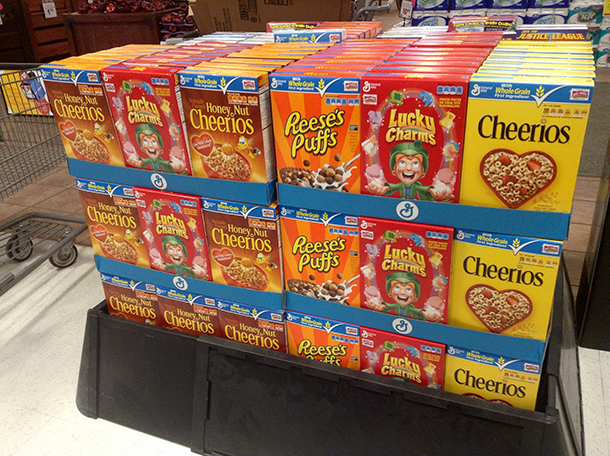Cheerios Go Green
Air Date: Week of September 4, 2015

General Mills makes many different products; its cereals include Cheerios, Lucky Charms and Reese’s Puffs. (Photo: Mike Mozard, Flickr CC BY 2.0)
Extreme weather events and drought threaten the world’s food supply, and the profitability of large food companies. Some multinationals such as Unilever and Walmart are adopting practices to fight global warming, and General Mills is now aggressively requiring more climate-friendly ingredients from its suppliers. General Mills’ Vice President and Chief Sustainability Officer Jerry Lynch tells host Steve Curwood about the company's plan to drastically cut its global warming gas emissions along its entire value chain from farm to fork to disposal.
Transcript
CURWOOD: It's Living on Earth. I'm Steve Curwood. With the clear evidence that global warming is advancing, more and more businesses are stepping up to reduce their climate changing emissions and adapt to the future. This week the spotlight is on General Mills, the $20 billion a year food giant with the famous brands of Cheerios, Betty Crocker, Haagen Dazs, Pillsbury and Yoplait. Now a diversified food company, General Mills got its start 150 years ago milling grain into flour along the upper Mississippi River in Minnesota. In recent years it’s converted its entire cereal line to whole grains, and is increasingly concerned about global warming because drought and other weather catastrophes are bad for the planet and business, says Jerry Lynch, Vice President and Chief Sustainability Officer.
LYNCH: As part of our efforts to conserve and protect the natural resources that we depend on as a business, we announced our commitment to reduce our absolute emissions by 28 percent versus our 2010 baseline across our full value chain from farm to fork to landfill by 2025. To get to sustainable emission levels based on the best scientific consensus by 2050, that would point to somewhere between a 50 and 70 percent reduction across our value chain.
CURWOOD: Tell me how you're going to implement this. I gather you're not just making changes, but you want the people who you do business with to make changes as well.
LYNCH: Yeah, we absolutely do, and we've had a fair amount of experience in our own supply chain. We've made absolute greenhouse gas reduction levels of 13 percent since 2005, but roughly only 15 percent of the greenhouse gas emissions occur inside our four walls. Two-thirds of our emissions are upstream of us in agriculture, and our value chain represents everything from farm to our production operations to our transportation to the way that products are retailed as well as to the way that consumers end up using the products of the end, and so we'll be partnering with the Field to Market Alliance for Sustainable Agriculture. You've got seed and input companies, grower groups like the Wheat Farmers of America, the corn growers; you've got aggregators like Cargill and Bunge, food companies like ourselves, Unilever, Kellogg's, Campbell's; retailers like Walmart, USDA; most of the major environmental organizations, in order for us to make a difference in where we need to be as a planet, we really have to address the full value chain for the sake of our business and the sake of consumers that consume our products.

General Mills logo (Photo: Public Domain)
CURWOOD: In terms of proportion, where do you emit the most greenhouse gases?
LYNCH: The largest areas are in dairy and in the row crops that we purchase to make our products, and those are all part of a commitment that we made to sustainably source those ingredients by 2020 several years ago.
CURWOOD: Let's say that I was in the business of growing oats to make your famous Cheerios. What kind of expectations might I receive from you in terms of how I grow those oats?
LYNCH: Really it’s about leading growers to innovation that's more sustainable and proving to them that more sustainable choices are more resilient and profitable choices. We have a group of oat growers engaged in this work. They measure their sustainability impacts across six different criteria right now including greenhouse gas emissions and soil carbon. And every year we help them look at the data and then provide to them stimulus and some of the best practices that we're seeing elsewhere that can lead to more sustainable and profitable choices. So it really is a matter of working with progressive farmers and farmers then tell each other about how this is making a difference in their own operations, and really leads the full community in that direction.
CURWOOD: So how do you reduce emissions from the production of milk?
LYNCH: If you look at the emissions associated with dairy, it's all about the cow, what the cow eats. So it's broken down into three big parts: one is the emissions that come in the production of the crops that the cows eat. And so, better use of fertilizers, better use of energy, building resilient soils that actually sequester carbon. You can do a good job of addressing the greenhouse gas emissions in that third. The Dairy Innovation center on the middle third has a great project about the cow of the future, to reduce their emission levels, weather it's through diets, through herd management, management of gestation cycles so that the cow is as healthy as possible. And the third piece of that is manure management on the back end, so to speak, and so the Dairy Innovation center along with the USDA has made a commitment to roll out several hundred bio-digesters that takes dairy waste and turns it back into energy and nutrients that can go back onto crops as well as bedding for the animals. The Dairy Innovation center has set a goal to reduce the greenhouse gas emissions on US fluid milk by 25 percent by 2020, and so bringing that into our own supply chain will make a big difference in addressing this goal.
CURWOOD: Why is addressing climate change an important issue for General Mills and why did your company decide to make such a strong commitment at this time to climate action?
LYNCH: Well it's one of the most pressing in environmental issues that we face. There's a number of risks that it presents to our livelihoods, and to our business, and to the shared planet if we don't address them. It plays a major role in the health of our ecosystems that support our consumers and our agriculture. Climate change is going to place stress particularly on some very vulnerable regions of the world that are important to us. If you look at West Africa, two countries produce 70 percent of the world’s cocoa, 90 percent of the worlds vanilla is purchased in Madagascar – we’re pretty dependent on that vanilla for Haagen Dazs - 80 percent of the world almonds come from California which is in a stretch of its worst drought ever. And so we think it's important to act because we got to manage the risk in our supply chain and because consumers and customers are increasingly asking us to be part of the solution.
CURWOOD: Jerry Lynch is the Vice President and Chief Sustainability Officer at General Mills. Thanks so much for taking the time today, Jerry.
LYNCH: My pleasure. Thanks for talking with me.
Links
General Mills' Press Release on Climate Change
About Jerry Lynch, Vice President and Chief Sustainability Officer at General Mills
Living on Earth wants to hear from you!
Living on Earth
62 Calef Highway, Suite 212
Lee, NH 03861
Telephone: 617-287-4121
E-mail: comments@loe.org
Newsletter [Click here]
Donate to Living on Earth!
Living on Earth is an independent media program and relies entirely on contributions from listeners and institutions supporting public service. Please donate now to preserve an independent environmental voice.
NewsletterLiving on Earth offers a weekly delivery of the show's rundown to your mailbox. Sign up for our newsletter today!
 Sailors For The Sea: Be the change you want to sea.
Sailors For The Sea: Be the change you want to sea.
 The Grantham Foundation for the Protection of the Environment: Committed to protecting and improving the health of the global environment.
The Grantham Foundation for the Protection of the Environment: Committed to protecting and improving the health of the global environment.
 Contribute to Living on Earth and receive, as our gift to you, an archival print of one of Mark Seth Lender's extraordinary wildlife photographs. Follow the link to see Mark's current collection of photographs.
Contribute to Living on Earth and receive, as our gift to you, an archival print of one of Mark Seth Lender's extraordinary wildlife photographs. Follow the link to see Mark's current collection of photographs.
 Buy a signed copy of Mark Seth Lender's book Smeagull the Seagull & support Living on Earth
Buy a signed copy of Mark Seth Lender's book Smeagull the Seagull & support Living on Earth

